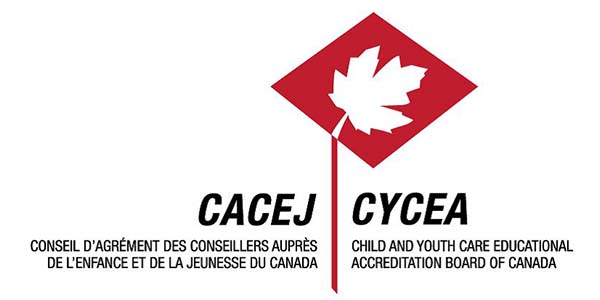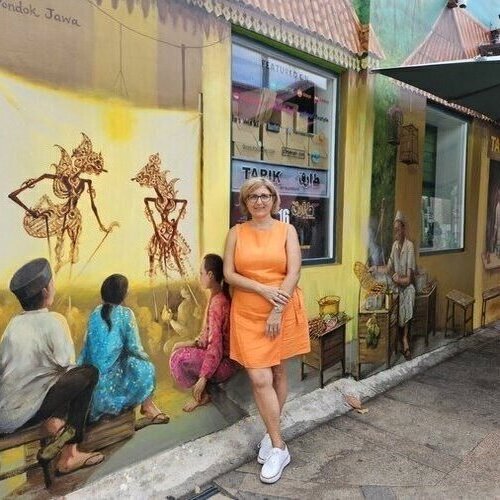MSc Child & Youth Care Studies by Distance Learning
ApplyKey facts
- Start date: September
- Study mode and duration: 24/36 months part-time distance learning
Part-time study: available by part-time online distance learning
Study with us
- aimed at those with an interest in developing positive strategies for affirming and developing the professional identity of child and youth care practice
- develop a theoretically informed, practice-based understanding of issues related to the social, political and cultural contexts of children and youth
Looking to find out more about this course? Watch our MSc Child & Youth Care Studies by Distance Learning information session recording.
The Place of Useful Learning
UK University of the Year
Daily Mail University of the Year Awards 2026
Scottish University of the Year
The Sunday Times' Good University Guide 2026
Why this course?
Developed in partnership with the Centre for Excellence for Children’s Care and Protection (CELCIS), the programme has a fresh, engaging curriculum that draws from a variety of disciplines and approaches including child and youth care, social pedagogy, sociology, psychology, health, education, social work and social policy.
You'll develop a theoretically informed, practice-based understanding of issues related to the social, political and cultural contexts of children and youth.
The programme considers and examines theoretical and policy contexts, child development in the lifespace, critical reflection, relational practice, management and leadership, intervention methods and research methods.
The role of the state, non-governmental agencies and private organisations in the provision of child welfare services will be examined along with the internationalisation of child welfare policy through developments such as the UNCRC. A range of approaches and traditions of childcare practice will be considered, including child and youth care, social pedagogy, residential childcare and social work.


Interested in postgraduate study?
At the Faculty of Humanities and Social Sciences, our friendly and knowledgeable team will be available to provide you with all the information you need to kick-start your postgraduate journey at the University of Strathclyde. Register for upcoming events below:

Child and youth care workers require to develop a theoretically informed, practice-based understanding of issues related to the contexts of children and youth. The ability to develop and be in meaningful relationships is central to the child and youth care task.
Programme Leader
How's the course delivered?
The programme is delivered entirely online with no physical attendance requirement. Classes involve a range of individual tasks – directed reading, podcasts, forum boards – in addition to one live online session per week where the student group participate in an online seminar.
Teaching staff
What you'll study
You'll complete six taught modules, followed by a practice-based dissertation.
There are specific learning outcomes for each module. On successful completion of the programme, you'll be able to:
- critically analyse a body of knowledge and literature on child and youth care and other related disciplines, incorporating a variety of international perspectives
- demonstrate a critical awareness of diverse international and ideological perspectives to childcare and models of service delivery and to critique these accordingly
- demonstrate a critical awareness of both the positive contributions and limitations of these international and ideological perspectives whilst still demonstrating an understanding of the distinctive elements of child and youth care practice
- begin to develop strategies for affirming and seeking to develop the professional identity of child and youth care
- locate childcare and development with an ecological framework which takes into account individual, systemic and cultural influences
- consider the ‘lifespace’ (the living environment as experienced by children and youth) as an arena for therapeutic intervention
- demonstrate research mindedness and critical thinking as well as an ability to critique literature, research and social policy developments
- draw upon practice knowledge in a critical and theoretically informed manner in order to generate academic knowledge
Research project
You’ll carry out a research dissertation in a subject area of your choice. We'll allocate a supervisor for one-to-one support whilst you carry out and report your dissertation.
Computer & software access
You will require regular access to a reliable computer with sufficient processing capability and an excellent broadband connection. Your computer must have a recent version of Microsoft Windows and Microsoft Office or Open Office. It should also be enabled for pop-ups.
We’ll communicate with you by e-mail and via the University's Virtual Learning Environment. Please make sure you can use the following programs:
- Microsoft Word, Excel & PowerPoint or a compatible program, eg OpenOffice
- an e-mail program compatible with Microsoft software; we recommend Outlook
- Adobe Connect
- WinZip or the ability to un-zip files and folders
- Adobe Acrobat Reader
- Windows Media Player
Professional recognition
We're members of The Child & Youth Care Accreditation Board of Canada (CYCEAB) and sit on the CYCEAB Research Committee and the CYCEAB Education Committee.
The programme is accredited by the Child and Youth Care Educational Accreditation Board of Canada as a provider of quality post-secondary education in the field of Child and Youth Care.

Globalised Childhood: Theoretical & Policy Contexts
The aim of this class is for you to be able to develop an understanding of the approaches underpinning child and youth care. You'll be able to critically review the historical and current discourses which influence the nature of child and youth care services in their own country and elsewhere.
In charting the development of child and youth care, you should be able to draw links between the nature of provision and prevailing socio-political and cultural factors including, where relevant, legislation and social policy. The global adoption of the United Nations Convention on the Rights of the Child (UNCRC) will be examined and its influence on child care practice globally critically analysed.
Child Development in the Lifespace
The aim of this class is for you to critically analyse how your understanding of child development helps you to understand children and inform their practice. You'll explore and critique key research and theories of child development and childhood to support a developmental orientation that informs your understanding and assessment of children and youth.
The impact of disability, adversity, disadvantage, discrimination, abuse, separation, grief and loss will all be considered as well as the skills involved in observing, assessing and understanding children and youth in their lifespaces.
Management & Leadership
The aim of this class is provide you with a critical understanding of the key concepts of management and leadership and their importance in creating and maintaining effective therapeutic child and youth care environments.
The importance of organisational culture will be explored alongside an analysis of the key managerial and leadership qualities, emotional intelligence and empathy, which are necessary to promote the growth and development of individuals and teams.
Critical Reflection & Relational Practice
The aim of this class is to encourage you to critically evaluate your interactions with children and youth with a view to developing and enhancing skills in the area of relational practice.
You'll engage with Video Interaction Guidance (VIG) and Video Enhanced Reflective Practice (VERP) as a means to develop your ability to critically reflect upon your communication skills and use of self in addition to improving your self-awareness and practice in a manner where you model and demonstrate reflexivity.
Interventions
The aim of this class is to encourage you to evaluate interventions with children and youth across a range of child and youth practice areas with a view to you developing effective practice and programmes of intervention.
There will be an examination of the components of effective therapeutic milieu and programmes, and you'll be encouraged to consider a specific intervention or change that you implement in the workplace.
Research Methods
The aim of this class is to encourage you to be research minded, and provide you with an understanding of the nature, characteristics and ethical considerations involved in research in child and youth care.
In doing this, you'll develop a critical understanding of the philosophical and methodological aspects of carrying out research with children and youth.
Masters Research Project
This is a substantial independent study class which forms the final, compulsory, element in the MSc in Child and Youth Care Studies by Distance Learning programme.
It involves carrying out an investigative and developmental programme of work which is of professional relevance to you. This will be assessed on the basis of a dissertation of approximately 15,000 words. The work enables and obliges you to draw on the skills and insights acquired in the taught element of the Masters programme.
Learning & teaching
The programme is delivered entirely online with no attendance required.
Modules involve a range of individual and group tasks in addition to live online sessions where the student group will participate in online seminars.
You’ll require:
- access to a reliable computer with sufficient processing capability
- an excellent broadband connection
- the ability to run applications such as Adobe Connect, Adobe Reader, Flash Player, Java and Windows Media Player
Entry requirements
| Academic requirements/experience | To be eligible for this course you require a first degree or relevant professional qualification, or a combination of qualifications and experience demonstrating capacity for postgraduate study. You’ll also require sufficient access to childcare settings through which you can evidence programme and practice requirements. This will involve working or volunteering in a childcare setting, either part-time or full-time, throughout the duration of the programme. The course assessments will require you to:
These requirements are designed in a way that makes the course accessible to everyone working in a childcare setting. They're also broad enough to allow those in external management and supervisory positions to do so. The course is not suitable for anyone not currently working, volunteering or connected to a childcare setting. Evidencing this requirement will form part of the application process. |
|---|---|
| English language requirements | Please check our English requirements before making your application. |

I particularly benefitted from the weekly live sessions with the rest of the cohort. It was a very eclectic and diverse group, both from a professional as well as a cultural point of view. I found sharing views in debates over some of the issues relating to Child and Youth Care and sharing experiences with my classmates very enriching.

I love that I am always learning alongside my students as a ‘facilitator of knowledge’, rather than always the ‘subject expert’. I love challenging the students to question the status quo, myself, others, and- most importantly- question themselves.
Fees & funding
Fees may be subject to updates to maintain accuracy. Tuition fees will be notified in your offer letter.
All fees are in £ sterling, unless otherwise stated, and may be subject to revision.
Annual revision of fees
Students on programmes of study of more than one year (or studying standalone modules) should be aware that the majority of fees will increase annually.
The University will take a range of factors into account, including, but not limited to, UK inflation, changes in delivery costs and changes in Scottish and/or UK Government funding. Changes in fees will be published on the University website in October each year for the following year of study and any annual increase will be capped at a maximum of 10% per year. This cap will apply to fees from 2026/27 onwards, which will not increase by more than 10% from the previous year for continuing students.
| Republic of Ireland |
If you are an Irish citizen and have been ordinary resident in the Republic of Ireland for the three years prior to the relevant date, and will be coming to Scotland for Educational purposes only, you will meet the criteria of England, Wales & Northern Ireland fee status. For more information and advice on tuition fee status, you can visit the UKCISA - International student advice and guidance - Scotland: fee status webpage. Find out more about the University of Strathclyde's fee assessments process. |
|---|---|
| Scotland, England, Wales, N. Ireland & International | £4,750 |
| Additional costs | Course materials
International studentsInternational students may have associated visa and immigration costs. Please see student visa guidance for more information. |
| NHS employees | The Faculty of Humanities & Social Sciences is offering a fee reduction of up to 25% to employees of NHS partner agencies. Find out more about the 25% tuition fee reduction for NHS employees. |
Please note: The fees shown are annual and may be subject to an increase each year. Find out more about fees.
How can I fund my course?
Scottish postgraduate students
Scottish postgraduate students may be able to apply for support from the Student Awards Agency Scotland (SAAS). The support is in the form of a tuition fee loan and for eligible students, a living cost loan. Find out more about the support and how to apply.
Don’t forget to check our scholarship search for more help with fees and funding.
Students coming from England
Students ordinarily resident in England may be to apply for postgraduate support from Student Finance England. The support is a loan of up to £10,280 which can be used for both tuition fees and living costs. Find out more about the support and how to apply.
Don’t forget to check our scholarship search for more help with fees and funding.
Students coming from Wales
Students ordinarily resident in Wales may be to apply for postgraduate support from Student Finance Wales. The support is a loan of up to £10,280 which can be used for both tuition fees and living costs. Find out more about the support and how to apply.
Don’t forget to check our scholarship search for more help with fees and funding.
Students coming from Northern Ireland
Postgraduate students who are ordinarily resident in Northern Ireland may be able to apply for support from Student Finance Northern Ireland. The support is a tuition fee loan of up to £5,500. Find out more about the support and how to apply.
Don’t forget to check our scholarship search for more help with fees and funding.
International students
We've a large range of scholarships available to help you fund your studies. Check our scholarship search for more help with fees and funding.
Chat to a student ambassador
If you want to know more about what it’s like to be a Humanities & Social Sciences student at the University of Strathclyde, a selection of our current students are here to help!
Our Unibuddy ambassadors can answer all the questions you might have about courses and studying at Strathclyde, along with offering insight into their experiences of life in Glasgow and Scotland.
Apply
Start date: Sep 2026
Child and Youth Care Studies
Contact us
Prospective student enquiries
Contact a member of our team on LiveChat between 10am and 4pm (GMT)
Telephone: +44 (0) 141 444 8600
Have you considered?
We've a range of postgraduate taught and Masters courses similar to this one which may also be of interest.

